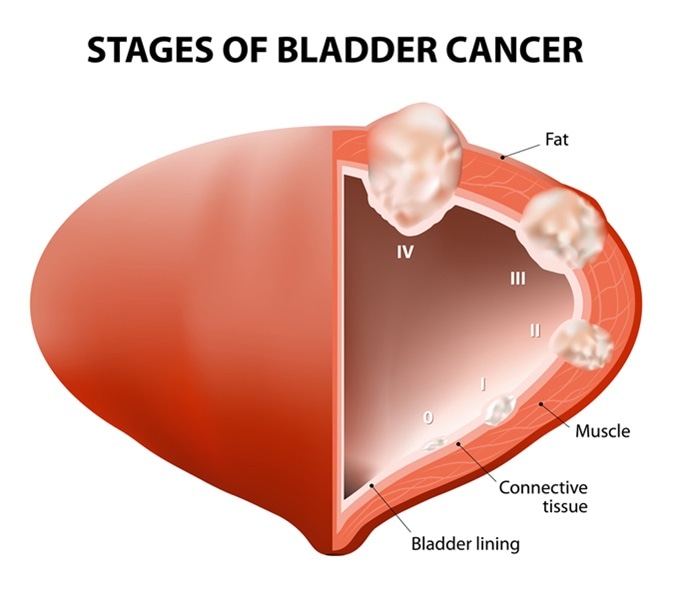Bladder cancer mostly develops in the urothelium that forms the inner lining of the urinary bladder. Other rare forms of this cancer include squamous cell carcinoma and adenocarcinoma.
Types of Bladder Cancer
In general, the type of bladder cell that undergoes neoplastic transformation determines the classification of bladder cancer. Three types of bladder cancers that have been classified are:
Urothelial carcinoma – almost 90% of bladder cancers originate from the urothelium, which is the bladder’s epithelial lining. This type of bladder cancer is also known as urothelial carcinoma, as well as transitional cell carcinoma. This is the predominant type in Western Europe and the United States.
Squamous cell carcinoma – chronic irritation of the bladder due to infections or prolonged use of urinary catheters is the main cause of developing squamous cell carcinoma. This type of cancer occurs frequently in countries where schistosomiasis infections (parasitic infections) are common, such as in Africa and the Middle East.
Adenocarcinoma – this type of cancer originates from the cells that are responsible for mucus secretion in the bladder. This is the rarest form of bladder cancer.

Diagram showing the stages of bladder cancer. Image Credit: Designua / Shutterstock
Risk Factors
The chance of developing bladder cancer can be increased significantly by several risk factors.
These include:
Tobacco smoking – smoking can increase the chance of developing bladder cancer by elevating the levels of toxic chemicals (aromatic amines and polycyclic aromatic hydrocarbons) in urine. When urine is stored in the bladder, these chemicals can damage the inner lining of the bladder, and thus, increase the risk of developing bladder cancer. It is known that smokers are 2 to 4 times more likely to develop the condition than non-smokers.
Occupational exposures – workplace exposure to aromatic amines, polycyclic aromatic hydrocarbons, and chlorinated hydrocarbons increases the chance of developing bladder cancer. Industries that produce these types of chemicals include painting products, rubber, leather, textiles, dye, metal, and petroleum product manufacturing units.
Drinking water – chlorination of the drinking water that produces trihalomethanes, as well as arsenic contamination of drinking water increase the risk of developing bladder cancer. Reduced consumption of water that leads to less frequent urination is also considered as one of the risk factors.
Certain medicines – chronicconsumption of certain diabetic medicines is associated with an increase in the incidence of bladder cancer. Administration of some chemotherapeutic drugs can also cause bladder wall irritation and increase the chance of bladder cancer. In addition, herbal supplements containing aristolochic acid are also believed to develop bladder cancer in some cases.
Chronic bladder inflammation – prolonged use of urinary catheters or parasitic infections that develop chronic urinary tract inflammation is associated with higher chances of bladder cancer.
Age – the risk increases as one ages. About 90% of bladder cancer patients are older than 55 years.
Gender – bladder cancer is more prevalent in men than women. It is the 7th and 17th most common types of cancers in men and women, respectively, worldwide.
Race and ethnicity – whites are 2 times more likely to be affected than other races.
Family history – having a family history of bladder cancer increases the risk of disease development. In some rare cases, inheriting some genetic diseases increases the risk as well. These include: retinoblastoma due to RB1 gene mutation, Cowden disease due to PTEN gene mutation, and Lynch syndrome or hereditary non-polyposis colorectal cancer due to mutations in MLH1, MSH2, MSH6, and PMS2 genes.
Inborn defects – bladder exstrophy, a rare type of birth defect in which the bladder is turned ‘inside out’ during fetal development and there is fusion with the abdominal wall, increases the chance of bladder cancer. In addition, a portion of the urachus (a connection between the bladder and the navel) that persists after birth can also increase the chance of developing bladder cancer.
Risk Factors with Bladder Cancer
Prevention
Certain steps that can be followed to prevent bladder cancer include:
- Stop smoking
- Reduce exposure to harmful chemicals by taking safety measures
- Drink plenty of water to wash out toxic chemicals frequently from the bladder
- Consume lot of fresh vegetables and fruits
Further Reading
Last Updated: Oct 19, 2018